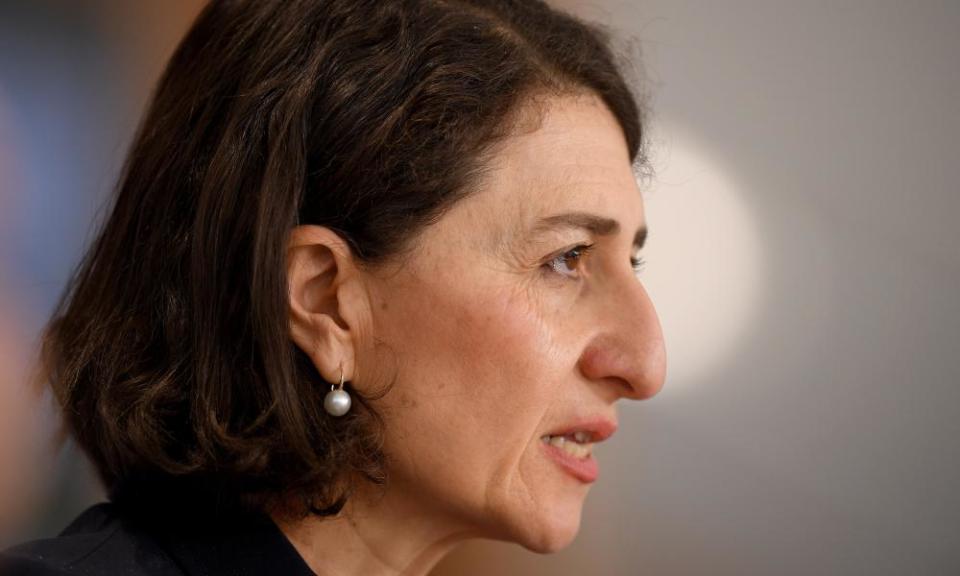The opening of Icac’s inquiry into Gladys Berejiklian was a contrast to her shock resignation

In contrast to the drama of the sudden and emotion-filled departure of Gladys Berejiklian as premier of New South Wales, the first day of the Independent Commission against Corruption inquiry that prompted her resignation was about as dry as it could get.
The opening was light on detail, a recitation of the allegations faced by the former premier in this reopening of an inquiry known as Operation Keppel.
These include that Berejiklian breached the public trust by exercising her public functions in circumstances where she was in a position of conflict between her public duties and her private life.
Under the microscope are two grants for projects in the seat of Wagga Wagga made when Berejiklian was either treasurer or premier – a seat held by Daryl Maguire, with whom she was in a close personal relationship.
The relationship, by her own account, was kept secret from her colleagues until its spectacular unveiling during the first hearings of Operation Keppel. Those hearings focused on Maguire.
Maguire has conceded to Icac that he used his public office to further his business interests. No findings have yet been made.
In the opening on Monday, counsel assisting Scott Robertson referred to telephone intercepts, played at the previous hearing, of Maguire talking to Berejiklian about a business deal.
“I don’t need to know about that bit,” the premier responded at one point.
Robertson said it went to the other question Berejiklian will face. Was Berejiklian sufficiently aware of Maguire’s actions and obliged, as the state’s highest public official, to report suspicions of corrupt conduct?
Berejiklian has vehemently denied wrongdoing and has said that history will demonstrate that she acted in the best interests of the people of NSW.
By mid-afternoon on Monday it felt a little bit like watching a very long fuse being lit. Would it end with a whimper or a bang? We will find out in coming weeks.
The first witness was Michael Toohey, a director in the Office of Sport, who had the unenviable task in late 2016 of preparing the documentation for a $5.5m grant for a new clubhouse and convention centre for the Australian Clay Target Association in Wagga.
The lifelong bureaucrat was very familiar with the proper steps that should be taken to handle a request for funding from the minister’s office.
He had helped draft the public service guidelines on preparing business cases. He knew what should be provided to assess viability, and if it passed muster, how it would be transformed into a cabinet submission, with opportunities for other departments to comment.
Robertson walked Toohey through the usual process in painstaking detail.
But, according to Toohey, it immediately became clear that this project had not followed the normal track.
“Fancy a challenge?” Toohey’s boss Paul Doorn wrote in mid-November 2016. “The minister’s office want a submission for ERC (expenditure review committee) Today!”
Toohey said the urgency was “extremely unusual”. “I don’t remember it happening before.”
The project had a business case prepared by engineering consultancy GHD, but Toohey told the inquiry there was an “inadequate” assessment of the benefit to cost ratio of the project.
He said important things were missing like details of the design and whether the club had the financial capability to pick up any shortfall if the project went over budget.
Toohey said he recommended it should get money only for a further study. But he was told the minister’s office wanted the project to go forward.
Instead he was told to prepare the submission. It went to the expenditure review committee, chaired by Berejiklian, less than a month later and was given conditional approval.
In early January 2017 Maguire announced the project in a press release. Toohey said he was surprised and that this too was out of the ordinary.
Like the rest of us, Toohey said he had no idea at the time that Berejiklian had a relationship with Maguire.
Asked what he would have done if he had known he replied: “I would have expressed my concerns through the executive structure and into the minister’s office …. Why were we pushing an allocation of funds to a local member with such scant information?”
“I can’t see how this is anything but a conflict of interest,” he said.
Obviously there is much at stake for Berejiklian. But there is also a lot at stake for Icac and for the chances of a federal integrity commission with teeth.
Related: Why is Icac examining the public and private lives of Gladys Berejiklian?
The prime minister, Scott Morrison, has already declared that the political downfall of Berejiklian demonstrated that Icac was “a real problem.”
“It is certainly not a model we ever consider at a federal level, anything that has been on display for some time,” he said.
The government’s model for a federal Icac involves hearings in private and a much higher standard – a criminal offence – in order to bring proceedings against a federal politician.
Aside from the lack of judgment shown in commenting on current proceedings involving a political colleague, the prime minister’s comments show a woeful lack of insight into Icac’s processes.
Icac investigators have already held private hearings and taken statements from its witnesses under oath. It already knows the answers to many of the questions that the public will hear asked in coming days.
It has weighed the options of investigating in private or holding public hearings, the value in public exposure of its investigations into potentially corrupt conduct versus the detriment to the reputations of those involved, and decided that the public interest is best served by public hearings.
These hearings will demonstrate the importance of this course of action, not just in either clearing or making a finding against Berejiklian, but to demonstrate the importance of sunlight as a disinfectant on the process of making grants as a whole.

 Yahoo Finance
Yahoo Finance 